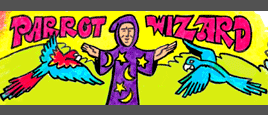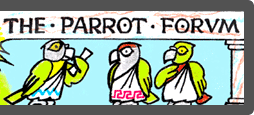I am new here, and need as much help as I can get.
I have a DNA sexed female Molluccan cockatoo who has been a mutilator on and off since I owned her.
She is approx. 12-14 years old and came to me with this problem.
She did quite the number on herself last December and we haven't been able to get a handle on it since then.
She is under the care of a good avian vet, is on pellets, fresh foods and some seeds in foraging toys only. She is fully flighted, gets a shower 1-3 times a week and forages for about 50% of her food (working on increasing that).
She is currently in in e-collar (plastic apron type) which I hate, but I have no option.
She is also a bit of a screamer for attention, and any suggestions to help would be appreciated. Please ask any questions you may have - this is just a basic background - I feel it's easier ot address specific questions, rather than going through her rather long and complicated history.



Mutilating cockatoo, long term....last ditch effort ...
6 posts • Page 1 of 1
- NewGirl82
- Parakeet
- Gender:

- Posts: 2
- Number of Birds Owned: 3
- Types of Birds Owned: cockatoo, eclectus, pionus
- Flight: Yes
Re: Mutilating cockatoo, long term....last ditch effort ...
The e collar is good. She is a big enough bird to handle it. I would also use a spray shower with allovara to help her skin.
Sorry - I never could spell.
Sorry - I never could spell.
- Lizz
- Conure
- Gender:

- Posts: 105
- Location: Archdale NC USA
- Number of Birds Owned: 8
- Types of Birds Owned: DYH Amazon Rambo
BF Amazon Myrtle
Cockatiels: Shadow Tammy Tommy Maggie Cagney Lacy - Flight: Yes
Re: Mutilating cockatoo, long term....last ditch effort ...
Based on the information given, it would appear that I can rule out a medical reason for this behavior. Or can I? Well lets just say that I will rule out parasites as a causative.
I would like more information on what her diet is? What type of light schedule she is on including what time she gets up in the morning and goes to sleep at night? Also how much time do you spend with her just out of the cage and also one on one time?
I would like more information on what her diet is? What type of light schedule she is on including what time she gets up in the morning and goes to sleep at night? Also how much time do you spend with her just out of the cage and also one on one time?
- Wolf
- Macaw
- Gender:

- Posts: 8679
- Location: Lansing, NC
- Number of Birds Owned: 6
- Types of Birds Owned: Senegal
African Grey (CAG)
Yellow Naped Amazon
2Celestial Parrotlet
Budgie - Flight: Yes
Re: Mutilating cockatoo, long term....last ditch effort ...
We have done everything medically possible to rule out issues in that regard (cultures, bloodwork, et.c,) and I am convinced it is behavioral.
She is covered around 8-830 pm, I leave for work around 7 am and she is uncovered then, but the house is still quiet.
I work a full time job, but when I am home, she is out - either on top of her cage with foraging toys and foot toys, or actually with me.
I try to limit hands on contact and excessive petting, as many people have suggested a hormonal component.
She eats pellets, fresh foods in the am (sweet potato, brown rice, small amounts of yogurt, small amounts of granola, a dried veggie mix) as well as a chunk of banana after her hydrotherapy. She also gets pureed squash with her meds twice a day.
She is covered around 8-830 pm, I leave for work around 7 am and she is uncovered then, but the house is still quiet.
I work a full time job, but when I am home, she is out - either on top of her cage with foraging toys and foot toys, or actually with me.
I try to limit hands on contact and excessive petting, as many people have suggested a hormonal component.
She eats pellets, fresh foods in the am (sweet potato, brown rice, small amounts of yogurt, small amounts of granola, a dried veggie mix) as well as a chunk of banana after her hydrotherapy. She also gets pureed squash with her meds twice a day.
- NewGirl82
- Parakeet
- Gender:

- Posts: 2
- Number of Birds Owned: 3
- Types of Birds Owned: cockatoo, eclectus, pionus
- Flight: Yes
Re: Mutilating cockatoo, long term....last ditch effort ...
What part of the world do you live in? As to the hormonal component, it could be playing a role in this behavior right now and is part of the reason that I asked about her light schedule and what her diet consists of. Birds are affected by light in ways that most of us don't even conceive of. Basically birds need to be exposed to the twilight periods of dawn and dusk as this appears to be the main on and off switch used in adjusting their endocrine system to the proper time of the year, and the endocrine system controls nearly all of the hormone production in their body. Do some research on photoperiodism in birds. Also an abundance of protein in their diet is also a trigger to go into breeding condition and this translates into hormones as well. Physical contact with your bird is one of the things that they crave almost as much as they need air and this is due to the fact that they are hardwired for it as in natural conditions they will never spend one minute of their lives alone from hatching until death. The problem is not petting them , it is inappropriate petting of their backs and bellies which are, in birds, erogenous zones and should not be petted.
Another thing that I would take a close look at is the amount of soy in her food as soy has been linked to feather plucking and self mutilation in some birds. I' myself do not feed any soy to my birds at all and I have two birds that came to me plucking and one of them self mutilating and I am happy to report no more mutilation and only minimal plucking at this time.
I hope that this will prove to be useful to you and your bird.
Another thing that I would take a close look at is the amount of soy in her food as soy has been linked to feather plucking and self mutilation in some birds. I' myself do not feed any soy to my birds at all and I have two birds that came to me plucking and one of them self mutilating and I am happy to report no more mutilation and only minimal plucking at this time.
I hope that this will prove to be useful to you and your bird.
- Wolf
- Macaw
- Gender:

- Posts: 8679
- Location: Lansing, NC
- Number of Birds Owned: 6
- Types of Birds Owned: Senegal
African Grey (CAG)
Yellow Naped Amazon
2Celestial Parrotlet
Budgie - Flight: Yes
Re: Mutilating cockatoo, long term....last ditch effort ...
Wolf is correct. Her problem is indeed physical and not behavioral, my dear, because it's not a matter of a 'hormonal component', it's hormones through and through, no doubt about it. She has been producing sexual hormones non-stop for years (human light schedule, high protein diet with most likely soy which has estrogenic side effects) which NEVER happens in the wild (they stop producing them during the resting season) so she is sexually frustrated, add this to the fact that she is alone all day long (your full time job) and has restricted access to physical touch (trying not to stimulate her sexually) and you have a bird with a severe depression/anxiety and which is, most likely, in constant pain (overgrown gonads).
I am afraid that unless you can keep her on a STRICT solar light schedule, reduce her protein intake and provide her with company all day long, she will not get better, actually, she will get worse. I feel for you, I know that you are trying your best, but these birds are physiologically identical to their wild counterparts and they need to be kept under the same environmental conditions that they evolved to live in the wild which is EXTREMELY hard to do in a normal human household. I do it but I don't work and my entire life and household revolves around them -not a 'normal' lifestyle.
Have you consider a good sanctuary for her? The Oasis, Best Friends, Foster Parrots come to mind. Some people would recommend rehoming her but, unless you can find somebody that keeps them like I do (cage-free, solar schedule/full spectrum light, organic fresh food diet, flight, etc), it won't work out for her.
I am afraid that unless you can keep her on a STRICT solar light schedule, reduce her protein intake and provide her with company all day long, she will not get better, actually, she will get worse. I feel for you, I know that you are trying your best, but these birds are physiologically identical to their wild counterparts and they need to be kept under the same environmental conditions that they evolved to live in the wild which is EXTREMELY hard to do in a normal human household. I do it but I don't work and my entire life and household revolves around them -not a 'normal' lifestyle.
Have you consider a good sanctuary for her? The Oasis, Best Friends, Foster Parrots come to mind. Some people would recommend rehoming her but, unless you can find somebody that keeps them like I do (cage-free, solar schedule/full spectrum light, organic fresh food diet, flight, etc), it won't work out for her.
- Pajarita
- Norwegian Blue
- Gender:

- Posts: 18705
- Location: NW Pa
- Number of Birds Owned: 30
- Types of Birds Owned: RoseBreasted too, CAG, DoubleYellowHead Amazon, BlueFront Amazon, YellowNape Amazon, Senegal, African Redbelly, Quaker, Sun Conure, Nanday, BlackCap Caique, WhiteBelly Caique, PeachFace lovebird, budgies,
- Flight: Yes
6 posts • Page 1 of 1
Return to Health, Nutrition & Diet
Who is online
Users browsing this forum: Google [Bot] and 17 guests
